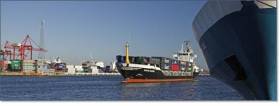Displaying items by tag: EU Port Regulation Deal
#PortRegulation - The European Commission, Council and Parliament after 15 years of discussions, have reached an agreement on a Port Regulation, a legal European framework for organising the port services and financial transparency for ports in Europe.
This week at the 4th trilogue meeting, the Dutch Presidency and the EP main negotiators reached a compromise. The port regulation can however only be considered as adopted after the formal approval by both the Parliament and the Council following their respective procedures. This formal approval process is expected to take place in autumn.
The European Sea Ports Organisation (ESPO) believes that the final compromise is, in many ways, a significant improvement on the original Commission proposal of May 2013. European ports welcome in particular:
A flexible framework for the organisation of port services respecting the diversity of port in Europe by allowing different tools (limitation, PSO, internal operator,…);
More financial transparency when ports receive public funding;
The way the initially very prescriptive provisions on customers and stakeholder relations have been amended in favour of more realistic general principles on how to deal with stakeholders and port users;
The fact that the concept of an “Independent Supervisory Body” was abandoned in favor of a more hands-on and less bureaucratic provision setting out a good mechanism for handling complaints;
The decision not to enlarge the scope of the directive on the award of concession contracts 2014/23/EU through this regulation.
ESPO however regrets that national governments have not shown more ambition in moving towards a clear framework for port authorities to set their own charges and develop their own financial strategy. European ports believe that the plea for less public funding for ports can only be realised if port authorities can manage themselves their financial situation and decide how to structure and optimise their income.
ESPO and its members considered the principle of autonomy as put forward in the initial Commission proposal and fully supported by the European Parliament as one of the main assets of the Port Regulation and an important condition for unleashing the potential of all European ports in Europe.
ESPO fully recognizes that the final text of Article 14 will be giving port authorities in Europe the possibility to determine the level and structure of the port infrastructure charges and to enter into individual negotiations with their customers. It remains however unclear to what extent national governments may limit this negotiating power of port authorities by setting general requirements within their national ports policy.
“The final text of Article 14 on infrastructure charges may be seen as a sort of consolidation of the current 2-tier system consisting of ports which can develop their charging system in an autonomous way and those ports that do not have these basic management tools. We must hope however that Member States will use this opportunity to review the way they consider ports and to realise that giving port authorities the power to negotiate and to develop their own charging policy is the best way to enhance the competitiveness of European ports and the level playing field”, says Secretary General Isabelle Ryckbost.
“We would like to thank the Commission, the Council and the Parliament for their constructive cooperation during this legislative process. Our special thanks go to the Rapporteur, Knut Fleckenstein, for his continuous support in favour of giving European ports more autonomy. We regret that the port regulation has not delivered fully on that point.” says ESPO Chairman Santiago Garcia Mila.





























































